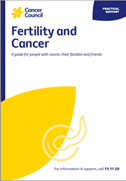- Home
- Cancer Information
- Managing side effects
- Fertility and cancer
- Emotional impact of infertility
Emotional impact of infertility
How people respond to infertility varies. It’s common to experience a range of emotions, and at times it may feel like you’re on an emotional roller-coaster.
Learn more about:
Common reactions
Common reactions include shock at the diagnosis and its impact on fertility, grief and loss of future plans, anger or depression from disruption of life plans, uncertainty about the future, loss of control over life direction, and worry about the potential effects of early menopause (such as reduced bone density).
The physical and emotional process of infertility treatment, and not knowing if it will work, can be exhausting. People who didn’t get a chance to think about their fertility until treatment was over say that the emotions can be especially strong.
While these feelings are a natural reaction to loss of fertility, see the opposite page for ways to manage these feelings before they overwhelm you. It may also help to consider other ways of becoming a parent, or you may decide to stop trying to have a child.
Learn more about the impact on your relationship with a partner and your sexuality.
For more on this, see Emotions and cancer.
I am glad my doctor helped me work through the emotions of what was my top priority. I finally felt that overcoming cancer and getting on with my life were most important and everything else came after that.
Duncan
Coping strategies
Learning that cancer treatment has affected your ability to have children can be challenging. There is no right or wrong way of coping. The strategies described here may help you feel a greater sense of control and confidence.
Gather informationThe impact of cancer on your fertility may change your plans or make them unpredictable. Knowing your options for building a family may help you deal with feelings of uncertainty. | |
Get support from othersTalking to people who have been in a similar situation or to family and friends can reduce feelings of isolation and help you cope. Consider joining a support group for people with cancer or fertility-related issues. | |
Consider professional counsellingYou can talk to a counsellor about the impact of infertility. Most fertility units have a fertility counsellor or you can find a private fertility counsellor near you at Access Australia. | |
Get creativeIf you don’t want to talk about how you are feeling, you could keep a journal or blog, or you could make music, draw, paint or craft. You can share your writing or artworks with those close to you or keep them private. | |
Try relaxation and meditation exercisesBoth of these techniques can help reduce stress and anxiety. Exercise such as walking can also help with mood changes and energy levels. |
→ READ MORE: Relationships and sexuality
Podcast: Meditation and Relaxation
Listen to more of our relaxation and meditation podcast
More resources
Prof Martha Hickey, Professor of Obstetrics and Gynaecology, The University of Melbourne and Director, Gynaecology Research Centre, The Royal Women’s Hospital, VIC; Dr Sally Baron-Hay, Medical Oncologist, Royal North Shore Hospital and Northern Cancer Institute, NSW; Anita Cox, Cancer Nurse Specialist and Youth Cancer Clinical Nurse Consultant, Gold Coast University Hospital, QLD; Kate Cox, McGrath Breast Health Nurse Consultant, Gawler/ Barossa Region, SA; Jade Harkin, Consumer; A/Prof Yasmin Jayasinghe, Director Oncofertility Program, The Royal Children’s Hospital, Chair, Australian New Zealand Consortium in Paediatric and Adolescent Oncofertility, Senior Research Fellow, The Royal Women’s Hospital and The University Of Melbourne, VIC; Melissa Jones, Nurse Consultant, Youth Cancer Service SA/NT, Royal Adelaide Hospital, SA; Dr Shanna Logan, Clinical Psychologist, The Hummingbird Centre, Newcastle West, NSW; Stephen Page, Family Law Accredited Specialist and Director, Page Provan, QLD; Dr Michelle Peate, Program Leader, Psychosocial Health and Wellbeing Research (emPoWeR) Unit, Department of Obstetrics and Gynaecology, The Royal Women’s Hospital and The University of Melbourne, VIC; Pampa Ray, Consumer; Prof Jane Ussher, Chair, Women’s Health Psychology, and Chief Investigator, Out with Cancer study, Western Sydney University, NSW; Prof Beverley Vollenhoven AM, Carl Wood Chair, Department of Obstetrics and Gynaecology, Monash University and Director, Gynaecology and Research, Women’s and Newborn, Monash Health and Monash IVF, VIC; Lesley Woods, 13 11 20 Consultant, Cancer Council WA.
View the Cancer Council NSW editorial policy.
View all publications or call 13 11 20 for free printed copies.
Need to talk?
Support services
Online Community
Check out this supportive online community for people affected by cancer
Cancer Connect
Talk to someone who has experienced cancer
Cancer information
How relationships can change
Learn how your relationships can change after you or someone you know has been diagnosed with cancer, and how to manage this
Dealing with the diagnosis
Common reactions to a cancer diagnosis and how to find hope

